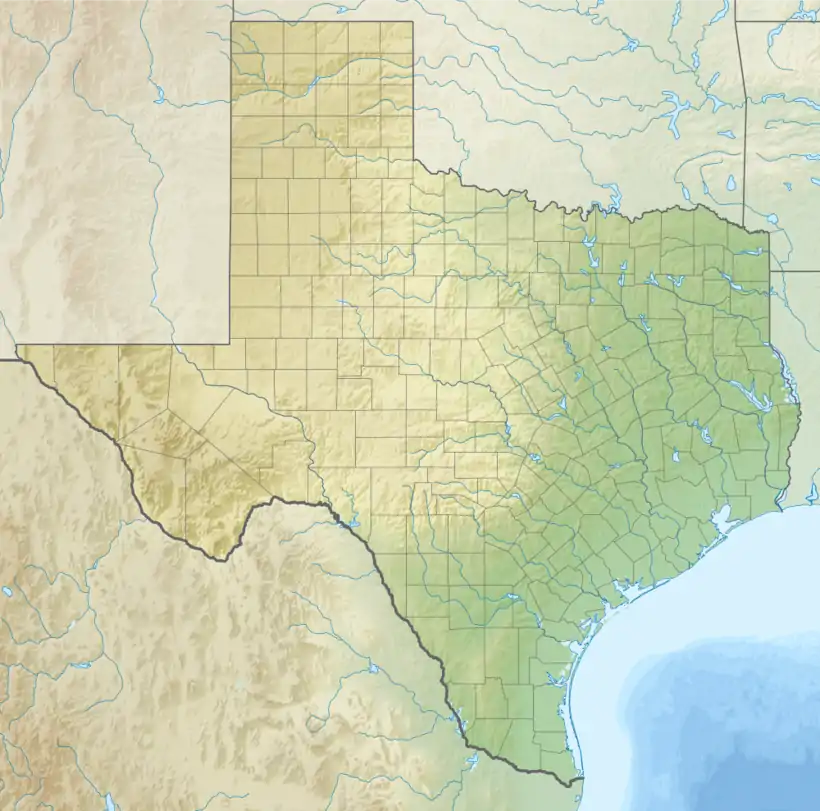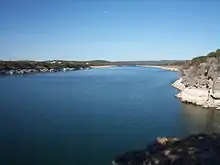Lake Travis
Lake Travis is a reservoir on the Colorado River in central Texas in the United States.
| Lake Travis | |
|---|---|
 Aerial view of Lake Travis in 2018 | |
 Lake Travis  Lake Travis | |
| Location | Travis / Burnet counties, northwest of Austin, Texas |
| Coordinates | 30°23′31″N 97°54′24″W |
| Lake type | Hydroelectric reservoir |
| Primary inflows | Colorado River |
| Primary outflows | Colorado River |
| Basin countries | United States |
| Surface area | 18,930 acres (7,660 ha) |
| Max. depth | 210 ft (64 m) |
| Water volume | 1,130,000 acre⋅ft (1.39 km3) |
| Shore length1 | 270 mi (434 km) |
| Surface elevation | 681 ft (208 m) |
| 1 Shore length is not a well-defined measure. | |

Serving principally as a flood-control reservoir, Lake Travis' historical minimum to maximum water height change is nearly 100 feet.[1] In 2018 alone, it saw a 20-foot depth increase within a single 24-hour period of time.[2] With 30 square miles of surface area, Lake Travis has the largest storage capacity of the seven reservoirs known as the Highland Lakes, and stretches 65 miles (105 km) upriver from western Travis County in a highly serpentine course into southern Burnet County to Max Starcke Dam, southwest of the town of Marble Falls. Besides being used for flood control and as a water supply, the lake is also used for electrical power generation and recreation.
The Pedernales River, a major tributary of the Colorado River, flows into the lake from southwestern Travis County.
History
Creation
The reservoir was formed in 1942 by the construction of Mansfield Dam on the western edge of Austin, Texas by the Lower Colorado River Authority (LCRA), and was built specifically to contain floodwaters in a flash-flood prone region. During its construction, after a severe flood in July 1938, the height of the dam was raised to add storage capacity for floodwaters.[3][4]
Ferry Service
Regularly scheduled ferry service between Point Venture and the south side of Hurst Creek began in April 1971, operated by Point Venture Development Co. The trip took 20 minutes and was the only inland ferry service in Texas at the time.[5][6]
September 2020 boat sinkings
On September 5, 2020, a boat parade took place in support of Donald Trump. The Travis County Sheriff's office reported that they had received multiple calls involving boats in distress, and that several boats had sunk.[7] The weather was calm, but the boats generated significant wake as they began to move together, which subsequently sank at least five boats.[8]
Recreational uses
Lake Travis is well known for its outdoor recreation opportunities, including fishing, boating, swimming, scuba diving, picnicking, camping, and zip lining. Another recreational use, nude sunbathing and swimming, is permitted in Hippie Hollow Park. This picturesque park is located near the eastern end of Lake Travis and is the only legal clothing optional park in Texas. Lake Travis is generally considered one of the clearest lakes in Texas. It is a vital water supply for the nearby city of Austin, Texas and the surrounding metropolitan area.
Fatality rankings
In ranking lakes in Texas for accidental fatalities, Lake Travis was in first-place in 2011 and tied for second-place for total deaths over the years 2000–2015.[9][10]
Six people drowned in Lake Travis in 2018, out of 29 total boating deaths reported across Texas that year.[11]
Fish populations
Lake Travis has been stocked with several species of fish intended to improve the utility of the reservoir for recreational fishing. Fish present in Lake Travis include largemouth bass, guadalupe bass, white bass, striped bass, catfish and sunfish.
In spring 2008 there were several reports of leeches residing in Lake Travis. The leeches are generally harmless to humans but can be a nuisance.[12]
Lake levels

Lake Travis is considered "full" (at maximum desired capacity) when the lake's water level is at 681 feet (208 m) above mean sea level (msl). Above 681 feet (208 m), flood control gates at Mansfield Dam are opened under the direction of the U.S. Army Corps of Engineers.[13] The level of the lake can vary dramatically—with an over 96-foot range between its historical high and low—depending on the amount of rainfall in the Colorado River basin upstream.[14] The historic high level on the lake was 710.4 feet (216.5 m) above msl on December 25, 1991, a little less than four feet below the dam's top/spillway at 714 feet (218 m) above msl. The historic low was 614.2 feet (187.2 m) above msl on August 14, 1951.
Droughts
The extreme drought of 2008-2009 brought the lake to its fourth lowest level at 626.09 feet (190.83 m) above msl in November 2009. The second lowest level was 615.02 feet (187.46 m) above msl on November 8, 1963.[15] During the 2010–13 Southern United States drought, levels went as low as 618 feet, making it the third lowest level ever.[16] The LCRA, a public utility whose responsibilities include the management of Lake Travis, makes water level reports available on the internet.[17] In April 2016, the lake returned to its full capacity at 681 ft.
Floods
Lake Travis serves as the primary flood control reservoir of the Highland Lake chain. The LCRA, under advisement from the U.S. Army Corps of Engineers, is responsible for floodgate operations at Mansfield Dam. Ideally, this is done in a time-delayed fashion after a major rainfall so as to either mitigate or outright prevent downstream flooding which otherwise would have been both immediate and extreme without the dam's presence. As Lake Travis levels increase during major floods, floodgate operations are conducted to protect property around Lake Travis as well as the dam itself.
While the dam's physical design assists in its own protection during floods, extensive spillway operations, a worst-case scenario which has not happened in the lake's history, could undermine the dam's base and affect its overall integrity. Under such conditions, operations are primarily intended to protect the dam, and lake water may be released to the dam's full, 24-floodgate capacity—regardless of downstream effects—to prevent the catastrophic loss of the dam.[18] Including its hydroelectric generators but not the spillway, at 681 feet above msl the dam's total maximum discharge capacity is more than 130,000 cubic feet per second (cfs); a bit under one million gallons per second.[19] Rates of discharge increase as water levels/pressures increase.
See also
References
- "Historical Lake Levels | LCRA". www.lcra.org. Retrieved 2020-09-07.
- "Lake Travis Water Level". Go Lake Travis. 16–17 October 2018. Retrieved 18 October 2018.
- "Mansfield Dam and Lake Travis". www.lcra.org.
- "Flood Operations Report". Lower Colorado River Authority.
- Dadamo, Amy Rae (2019-07-11). "Historic Lake Travis ferry once transported residents, cars between communities". impact. Archived from the original on September 8, 2020. Retrieved 2020-09-08.
- "The Story of Point Venture... Where Every Day's A Holiday". pointventure.com. Archived from the original on October 20, 2020. Retrieved 2020-09-08.
- "Multiple boats sink during Trump Boat Parade on Lake Travis". CBS Austin. 5 September 2020. Retrieved 5 September 2020.
- "5 boats sink at Trump boat parade on Texas' Lake Travis". www.cbsnews.com. Retrieved 2020-09-08.
- ...SportsDayDFW.com (18 May 2013). "Sasser: Boating safety is made simpler if you take these five steps..." The Dallas Morning News. Archived from the original on 22 October 2020. Retrieved 17 August 2016.
- "Lake Conroe deadliest for Texas boaters since 2000". Associated. Press. Retrieved 19 August 2020.
- Bradshaw, Kelsey. "Watch out for lurking hazards, unsafe boaters in Lake Travis, authorities warn". The Statesman. Retrieved 21 October 2019.
- "The Highland Lakes". Archived from the original on 2008-06-02. Retrieved 2008-06-14.
- http://www.lcra.org/water/dams/mansfield.html. Missing or empty
|title=(help) - "Lake Travis Water Level". www.golaketravis.com. Retrieved 2020-09-07.
- The lake rose to 642.39 feet above msl as of October 25, 2009 due to significant rains in September and October 2009. This places the level at 24 feet below normal level for October. "River Report" LCRA.
- http://www.lcra.org/water/conditions/river_report.html. Missing or empty
|title=(help) - Current LCRA lake and river conditions http://hydromet.lcra.org/riverreport/report.aspx#current
- "Key elevations for Lake Travis during floods | LCRA". www.lcra.org. Retrieved 2020-09-07.
- "Mansfield Dam and Lake Travis". Lower Colorado River Authority. Archived from the original on 31 August 2016. Retrieved 17 August 2016.
External links
| Wikimedia Commons has media related to Lake Travis. |
- Key Water Levels for Lake Travis During Floods
- "Lake Travis". Texas Parks and Wildlife. 2009-06-18. Retrieved 2009-09-03.
- "Mansfield Dam and Lake Travis". Lower Colorado River Authority. 2009-08-28. Retrieved 2009-09-03.
- Lake Travis from the Handbook of Texas Online
